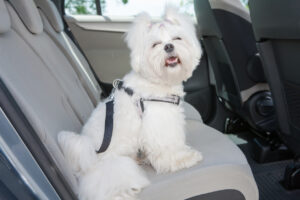Many of us know our dogs make road trips more fun. A four legged co-pilot offers great companionship and makes driving more enjoyable. Though taking a pet on a road trip requires extra effort, it is well worth it to have our furry family members along for the ride.
When taking our dogs on a car ride, an important consideration is their safety. In order to prevent injury and interference with the driver’s ability to navigate the vehicle safely, dogs should be properly restrained.

Though there is no legal requirement mandating pets be restrained while riding in a vehicle, it is important to do so for their safety as well as the safety of the driver and other passengers. If a collision occurs, an unrestrained dog is placed at tremendous risk of serious injury. An unrestrained dog can also become a dangerous projectile that can cause significant harm to others. Force is measured by calculating weight, speed and the distance required to stop. Using this calculation in a head on collision, a 50 pound dog traveling in a car going 30 miles per hour projects forward with an impact force of 1500 pounds.
Safety gear for dogs is divided into two categories. The first is classified as distraction prevention which is designed to keep the dog out of the driver’s seat. The second is crash protection which is designed to avoid injury. The Center for Pet Safety recommends quality crash tested harnesses which protect your pet and family.
The research completed by the Center for Pet Safety demonstrates not all pet safety harnesses are created equally. According to CPS, a dog that is not restrained and allowed to put their head out of the car window is at risk of injury. Debris from roadways can fly into a dog’s eyes causing injury that is painful as well as expensive.
The best safety harness for your pet is one that is CPS certified, The Center for Pet Safety recommends three different safety harnesses. The Sleepypod Clickit Sport, Sleepypod Clickit Terrain and ZuGoPet’s, The Rocketeer Pack. The testing and product performance requirements are extremely thorough. Participation by manufacturers is entirely voluntary and demonstrates their willingness to have their products thoroughly scrutinized in order to meet the rigorous requirements set forth by CPS.
When shopping for safety harnesses for pets, consumers should not take the word of the manufacturer that the equipment is crash rated. Verify certification through a third party such as the Center for Pet Safety. Though certified restraint systems are often more expensive, they are well worth the investment to assure your pet stays healthy and injury free.
